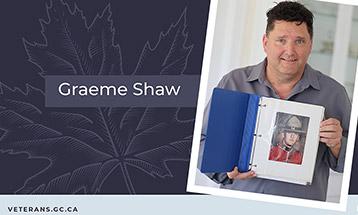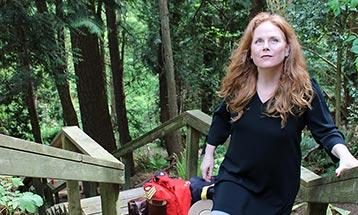
RCMP Staff Sergeant (Ret.) John Scott in uniform while with UNPOL in South Sudan.
Born in Te Awamutu, New Zealand, John Scott grew up on the island’s eastern coast in Napier. He joined the New Zealand Air Force Service Police in 1971 at the age of 18. Soon after, he moved to the New Zealand Police in Auckland, where “there was never a dull moment,” he says.
After five years, he took advantage of a police force employee program that allowed him to spend nine months in Europe for overseas experience. That awoke a yen for world travel.
“I was always interested in Vancouver,” he says. Tucked in between the ocean and the mountains, it seemed like a good choice. In 1977, John emigrated to Canada and soon became a West Vancouver Constable.
How did policing in Canada compare to New Zealand? “I was armed for the first time,” John recalls, “but had faced more guns in New Zealand than in Vancouver.”
After receiving his citizenship in 1980, John joined the RCMP. His first post was to Stony Plain, Alberta. It was there that he met Denise, whom he married in 1986.
As John’s career progressed, he was posted to many different locations in western Canada. In Edmonton, he joined the Serious Crimes Unit. He then went to Cardston, Alberta, a small town located between the U.S. border and the Blood Tribe Reserve. In Terrace, British Columbia, he became a Forensic Identification Specialist.
He commanded the Chetwynd Detachment in B.C., and was later the Watch Commander, Staff Sergeant, in Prince George. In 2004, John was commissioned to a position as the Grievance Adjudicator in Regina, SK, responsible for the three prairie provinces, the Depot Division in Regina, and two of the Territories. In 2009, he headed leadership training at the RCMP Pacific Regional Training Centre in Chilliwack.
In 2007, John’s career took him overseas for a 14-month tour as a peacekeeper in East Timor. One of six Canadian police officers in the 1,500-strong peacekeeping force, John served as UN Police Chief of Staff in charge of logistics, professional standards, staffing and training.
“There was lots of tension,” he recalls. “The President was shot and wounded by army deserters, and that resulted in martial law and curfews. As police peacekeepers, we were armed. The UN provided a security guard for our accommodations.”

John Scott (left) with Major Aleer Deny Keen of the South Sudan Police Service and part of the police service inspection team.
In 2012, John joined another peacekeeping mission in South Sudan, months after the country had gained independence. From the capital, Juba, he traveled widely with a team of South Sudan police officers completing inspections of state operations.
Malaria, typhoid, and the heat were constant threats, in addition to the violence. Travel often required helicopters that were shot at from time to time. Land mines were a constant concern. Children sometimes lost legs chasing a ball at school.
“The place was nuts,” John summarizes. “Two hours after meeting with the Major-General in charge of Eastern Equatoria State, he was killed in an ambush on the road,” John remembers. And, while on an inspection of police operations, he had to take cover from raids by the Lord’s Resistance Army, an infamous terrorist organization.
Nine months after that mission ended, John returned to South Sudan, this time working for UK Aid with on developing professional standards for the South Sudan National Police.
South Sudan was even more dangerous at this time. “I went out running one morning to the police check point at the edge of Juba. The police were gone and people in army uniforms were pointing guns at me. I knew one person there who allowed me to run back to the camp,” he says.
“You could hear AK-47s, machine guns, RPGs and tanks shooting all the time. After three weeks trapped in the compound, the airport reopened. We were evacuated, leaving the locals behind.”

John Scott (right), UN Police Chief of Staff, Timor-Leste, 2008, presenting certificate of Polícia Nacional de Timor-Leste registration to Sub-Inspector Carlos Montz Maia.
Friends in the South Sudan Police helped arrange for an escort to the airport for evacuation. Along the road there, he saw bodies piled at regular intervals.
The group was evacuated in a DC-9 that Air Canada had bought in 1964. John returned again to South Sudan in 2014. This trip was brief due to the conflict, and resulted in John retiring.But that wouldn’t last long.
“I got bored in retirement, and after two years I had had enough.” Even a vacation to Europe couldn’t satisfy John’s need to do something. So it was back to work in 2018, this time for Veterans Affairs Canada in Chilliwack. He finally retired—for good—in 2022 after six years at VAC.
Today, John satisfies his zest for adventure by running half-marathons in B.C. and New Zealand. Plans to travel to Africa and South America were delayed by COVID. This year, John and his wife plan to visit New Zealand and Australia, to visit their daughter Justine and their first grandchild. Another daughter, Stephanie, serves in the RCMP and son Sean has applied to join the Mounties. Both would love to one day be peacekeepers.
Tips to prepare for release
As someone who has retired twice, John admits he was unprepared the first time. “Everyone is different, but at 70, I have to make it work this time. I worked for VAC for six years and talked to many Veterans. There is so much I learned.”
John suggests that there is no all-encompassing formula for every Veteran to follow. “It’s essential to learn as much about all the available entitlements.” He suggests that those approaching release should search the Veterans Affairs Canada website for supports that meet their particular needs: for example, PTSD treatment, specific health care benefits or career transition.

The South Sudan Police inspection team, in Kajock, South Sudan, 2012. From left: Major Aleer Deny Keen, RCMP Inspector John Scott, Major Rizik Motto (now deceased), Warrap State Head of Prisons (in white), and Lt. Comm. Andrews.

John Scott (standing) working in Juba, South Sudan 2012 with the South Sudan Police Professional Standards Directorate.
If you or someone you know is struggling with the transition to life after service, check our website for services related to mental and physical health, finances, education or jobs and housing and home life. We also provide services to families and caregivers who support our Veterans.



